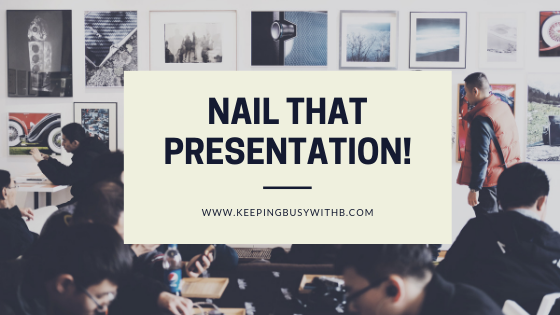
I’m going to give you a statistic. It’s going to be completely made up but I think you’ll agree: 90% of us don’t like making presentations.
Am I wrong?
For the 10% of you who do like making presentations, this post is not for you. But if you’re like me and the thought of public speaking kind of makes you want to throw up, then you’d better read on.
See what I did there? Already I’ve started to give you an effective presentation (even though you’re reading a blog post). I started off with a statistic you may or may not identify with and because it’s completely made up I’ve hopefully put you (my audience) at ease and maybe even made you laugh a little. But because I’ve humanized myself by identifying a common fear that most of us face I’ve made you intrigued: if I feel the same way as you do, what solution could I possibly have to fix the problem?
That’s how a good presentation should start: capture your audience, then identify yourself in relation to the issue you’ve raised. Once you’ve established a connection, you’ve established a certain level of trust; then you can make your intentions for the rest of the presentation known.
That’s half of what makes a good presentation work: appealing to the humanity of your audience and identifying a human component to your subject. Knowing who you’re presenting to and what’s important to them will take away a lot of the guesswork as to how to deliver your message more effectively.
The second half is preparation, which to the nervous folks in the crowd is the key to cutting your anxiety by half. Even if you consider yourself crap at public speaking, just taking the extra time to prepare may give you the confidence boost you need to get through your presentation.
And by prepping I don’t just mean reading your notes over and over until you have your whole speech memorized. In fact, some experts consider writing out your presentation beforehand a big no-no: memorizing means you run the risk of losing your place, and it may leave you with a false sense of security regarding your material. What happens if you get interrupted, get asked a question, or sense a mood shift in the room? A written presentation has no room for spontaneity.
However, if you write out your key points ahead of time and use visual cues in your notes (bullet lists, colours, capital letters, underlining) you can rehearse different ways of delivering your information so you’re prepared for just about any conceivable possibility. (Try to imagine several different scenarios to see how they would play out.)
Your prep work should also require some thought as to the sensory experience of your audience. Consider the seating arrangement, time of day, room temperature, lighting, and the quality of any equipment you may be using. These are all elements that factor into the attentiveness of your audience and their willingness to receive your message.
I’m not going to give you advice in the form of that old adage of picturing everyone in their underwear; I think the best thing you can do is to visualize yourself as confident, knowledgeable and above all more than able to pull off a fantastic presentation. (And that’s fully dressed.)

Holding your own in an office isn’t easy in a fast-paced, competitive and demanding work culture. Having been faced with similar challenges of my own, I’ve compiled some of the best ways to sustain yourself throughout your working life here. For more professional advice, and on how to market yourself or a product, click here or here.
What are some of the speed bumps you’ve hit working in an office? Share your workplace stories below or send them confidentially to keepingbusyb@gmail.com.

 Whenever I plan a trip for anyone (and considering I don’t travel all that often, you’d be surprised at how often I have done this for other people), I always joke about the extra work involved in taking time off. Vacations are supposed to be restorative, relaxing and fun but it’s easy to get caught up in stressing over the details of planning your holiday. Next thing you know, you’ve spent the first two days of your vacation trying to come down off of the adrenaline rush.
Whenever I plan a trip for anyone (and considering I don’t travel all that often, you’d be surprised at how often I have done this for other people), I always joke about the extra work involved in taking time off. Vacations are supposed to be restorative, relaxing and fun but it’s easy to get caught up in stressing over the details of planning your holiday. Next thing you know, you’ve spent the first two days of your vacation trying to come down off of the adrenaline rush.
 Yes, you can!
Yes, you can!